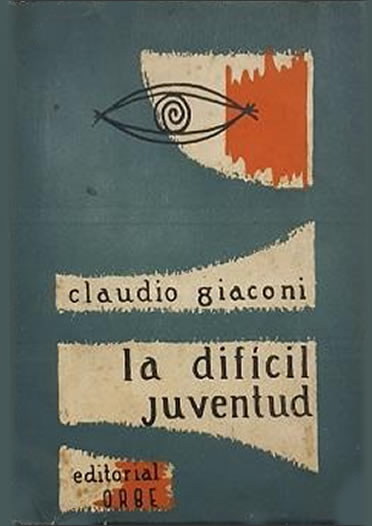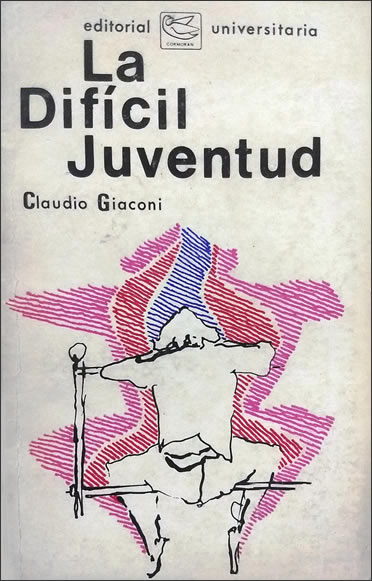Proyecto Patrimonio - 2020 | index | Claudio Giaconi | Autores |

CLAUDIO GIACONI La difícil juventud.
Santiago de Chile, Editorial Orbe, 1958, 150 págs.
Carlos D. Hamilton
Vassar College
Publicado en Revista Hispánica Moderna , Año 26, No. 3/4 (julio - octubre de 1960)
.. .. .. .. ..
Esta colección de once cuentos, cuyo título es el del primero, obtuvo el Premio Municipal de Literatura, en Santiago, el año 1955. Gogol, Joyce, Dostoiewski, Faulkner y el propio joven y original escritor chileno Giaconi nos hacen pensar en cuentos, como «Aquí no ha pasado nada», en esas experiencias incomunicables de que hablaba Virginia Wolf y que él comunica con un lenguaje directo, audaz, poético y filosófico, y a la vez natural e íntimo y cotidiano. El autor podría ser llamado «existencialista», como place a los críticos amantes de encasillar imponderables. La verdad es que el autor es «incomunicable», en el sentido de absolutamente personal, y da la rara y agradable impresión de que no se anda en tanteos. Domina cada tema, sabe lo que siente y quiere decir y lo expresa con economía de páginas y adjetivos, en un estilo ceñido y cargado de fuerza emocional a la vez que agudamente intelectual, sin pedanterías. Es un verdadero maestro de la narración y cada breve cuento capta un instante de la angustia contemporánea. Es el dueño indudable de su mundo, y aunque puedan enumerarse las «influencias», sólo son autores que este autor «se sabe», pero a los que no necesita para pensar y hacer pensar, sentir y emocionar, con una variedad de matices y de finuras psicológicas que acusan madurez, originalidad y buen gusto.

Claudio Giaconi. La difícil juventud.
Santiago. Universitaria. 1970. 140 pages.
Por Wolfgang A. Luchting
Washington State University
Publicado en Libros en el extranjero. Vol. 46, núm. 1 (invierno de 1972)
Chilean, more than any other Latin American literature, likes to be divided into generaciones. This satisfies the Chileans' obsession with history, any history. Giaconi belongs to
the generation del 50, whose best-known members are J. Edwards, E. Lihn, E. Lafourcade, A. Rubio, Giaconi et al. One of the most interesting statements about this generation is Giaconi's own lecture during the second Encuentro de Escritores Chilenos (Chillán, July 1958), the text of which, "Una experiencia literaria" opens this book. The twelve stories that follow adhere more or less strictly to the program that Giaconi, in his lecture, outlines as that of the mentioned generation: no more criollismo; openness to contemporary "universal" problems, i.e., no more local-yokelism; technically and formally daring new narrative methods; lots of psychology; as little plot as possible. The original La difícil juventud (1954) obtained the Premio Municipal (Santiago) del Cuento. The present edition adds "El sueño de Amadeo" (1959), a "story" about the awareness of getting older. The other texts, too, picture mainly what might be called "psycho-dramolets": on incommunication, the exaggeration of self-importance, old age, the difficulties of social integration, the deadliness of art criticism; the mice-and-men-theme, trust and distrust, and the discovery of death. Two texts are tours de force: "El conferenciante," which tells of a very dutiful German lecturer fighting increasingly grotesque circumstantial untowardness in a Chilean culture-institute, and "En un vagon de tercera," an interesting exercise in how to disguise melodrama while narrating it. The events —or non-events— always take place in the psyche of someone, i.e., the physical, the "action" plot is minimal. Today this "scene" is slightly outdated, a state of affairs which does not, however, detract from the narrative skill Giaconi's stories reveal. If there is anything that would merit a slightly adverse comment it is the generally present self-indulgence —through the choice of psychological conflicts— that I detect in the book. Historically, on the other hand, this indulgence is interesting, since, while still rather latent in La difícil juventud, it was to erupt quite blithely in more recent Chilean fiction (cf. young Antonio Skarmeta's Whitmanesque self-celebrations). Chilean narrative is almost always interesting. Giaconi's is no exception.